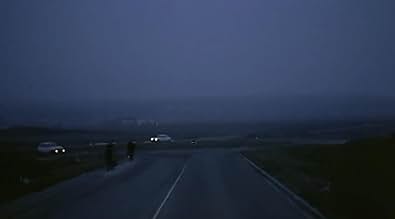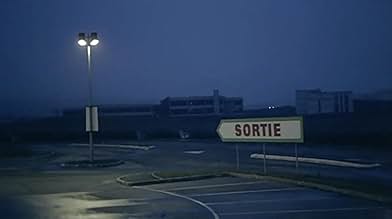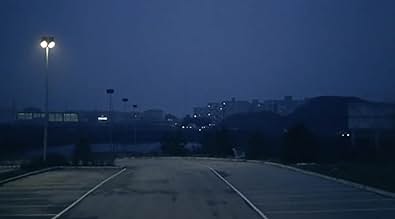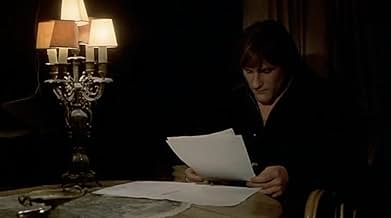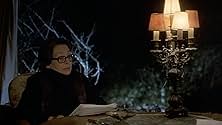Aggiungi una trama nella tua linguaIn this most talky and personal of films, director Marguerite Duras and actor Gerard Depardieu do an on-camera read-through of a movie script. Occasionally, the director comments about the c... Leggi tuttoIn this most talky and personal of films, director Marguerite Duras and actor Gerard Depardieu do an on-camera read-through of a movie script. Occasionally, the director comments about the characters or their motivations, and sometimes the actor does. That's all -- there is no ac... Leggi tuttoIn this most talky and personal of films, director Marguerite Duras and actor Gerard Depardieu do an on-camera read-through of a movie script. Occasionally, the director comments about the characters or their motivations, and sometimes the actor does. That's all -- there is no action, there are no location shots, no one pretends to be anything else. The script itself ... Leggi tutto
- Regia
- Sceneggiatura
- Star
- Premi
- 1 candidatura in totale
Recensioni in evidenza
Marguerite pretends to know what she's talking about and looks up as if telling Gerard what she's thinking, but obviously it's not that at all, because mid-sentence she has to glance at the page she's holding, or shamelessly start reading. Of course, she says each sentence delighting in her creativity as if she were devising the Tractatus Logico-Philosophicus.
The script she is reading is ridiculous, uninteresting, a delirious conversation between a trucker and a hitchhiker woman about the origin and end of the world, about the universe, about the proletariat; but Gerard Depardie is forced to say again and again I see, and put on a face of understanding or athat of someone experiencing an epiphany with each enigmatic outburst from Duras.
The film seems conceived, written and made in a couple of hours. That is not serious because obviously it has cost nothing: neither money nor effort. I guess Gerard Depardieu would participate for free, because he has nothing to do either, not even learn a script, since like Duras, he reads directly from some pages in front of him. I suppose that in those years he would find it a prestigious project.
Pulling on its literary prestige, she always had great names in French cinema acting in her sometimes unbearable films, and it is always interesting to see Jeanne Moreau or Delphine Seyring, even if they do nothing more than wander in front of the camera. When she wants to give her films more packaging, she also hires cinemagraphers like Sacha Vierny.
In Cannes Le camion was a scandal, and Duras seems to have had to endure insults. Terrible, this woman did no harm to anyone filming Le camion: I don't think she needed subsidies to make this film, I don't think anyone was fooled by promoting it as an action film...anyone who entered the cinema could expect what they would find.
We also have to thank her for never shooting that script she had planned: a shooting that, as she herself says, would be fast, cheap, in black and white. To make it clear that none of the images would correspond to that unshot film, what we see is in color.
Definitely not among Duras best.
The film cuts between Duras and Depardieu, filmed in one setting at night, in another at dusk; between shots, filmed from a moving vehicle, of the landscape-factories, lorry parks, the edges of towns constituting neither the urban built environment nor the rural; spaces of transport and passage-and shots of the titular blue lorry travelling through it, Beethoven's Diabelli Variations intermittently coming and going as if on the truck's radio. Duras notes in her script that the film could be shot in various different locales-all of them outside the metropolitan centre, through-spaces, neglected spaces, a 'land of migrants'. As such, they destabilise notions of national belonging, of the power relations read into landscape, while suggesting the fate of the economic periphery, that to the side of dominant narratives, in a manner far removed from the conventional representational framings of social realism, cinema verité, and the like. Like the room in which Duras and Depardieu read, the script describes the lorry's cabin as both darkroom and prison, safe house and space of incarceration. "I feel as though you and I, too, are threatened by the same light that they are frightened of; the fear that all of a sudden the lorry's cab, this darkroom, may be flooded by a stream of light, you see...The fear of a catastrophe: political intelligence /understanding." Is that fear the fear of political intelligence, or is its fear political intelligence in itself? What might this catastrophe be, insulated but constantly on the move? Is this even all an extended metaphor for the 'fellow traveller'? The film that would have been-yet which, in its rehearsal, retelling, conjectural description, is a film-is that stand in for the idea of revolution, of a non-derailed, non-betrayed communism that refuses compromises with the established order, in what Duras describes as a bargain between capitalism and socialism, "the infinite delay of any free revolution".
"Several explanations would have been possible".
OK, so what set of images and sounds do we have here? We have two types of scenes, either scenes of a blue lorry amongst industrial sprawl, or Marguerite Duras herself and Gerard Depardieu talking through a script about a hitch-hiker and a lorry driver. Duras' modus operandi with many of her films is to get you to see the real images of the film in your head, with the actual images on the screen merely your facilitator. You are to complete the story (as when you read a book). As it is, even this is difficult as the physical progress of the story is monotonous, however we are free to luxuriate and terrify ourselves in the simple yet sublime task of imagining the ocean, for example.
Collusion between classes is hinted at, a pact to mutilate our true selves. Dismayed talk about children being trained to be less personal foreshadows a later work, Les Enfants.
The images from Bruno Nyutten are almost paradoxically beautiful, how can the devastated countryside soothe the eyes so much? Rows of spindly leafless trees benefit from the accompanying Diabelli variations, and magic hour filming works its magic.
Pauline Kael famously spent two paragraphs dismissing Star Wars and seven paragraphs analysing Le camion, all within the same article around the time both were released (there also followed seven paragraphs on the prison film Short Eyes). Marguerite reveals herself in the film as quite the bright-eyed wampyr, disdainful of the patriarchy. Certainly she deserves triple and then some the attention of Star Wars.
This film is a punishment for being your conditioned self, or a billet-doux. Choose.
Lo sapevi?
- QuizMarguerite Duras's debut as an actress and she also wrote and directed this film.
- ConnessioniEdited into Passage des arts: Marguerite Duras, l'écriture et la vie (2021)
- Colonne sonore33 Veränderungen über einen Walzer von A. Diabelli op 120
Written by Ludwig van Beethoven
I più visti
Dettagli
- Tempo di esecuzione1 ora 16 minuti
- Mix di suoni
- Proporzioni
- 1.66 : 1
Contribuisci a questa pagina


